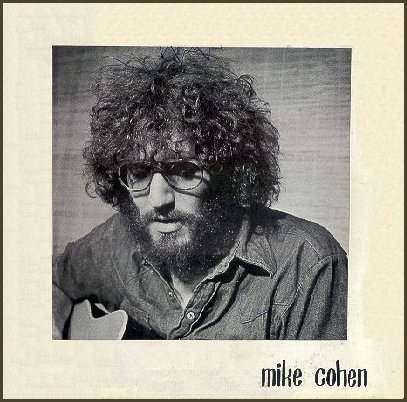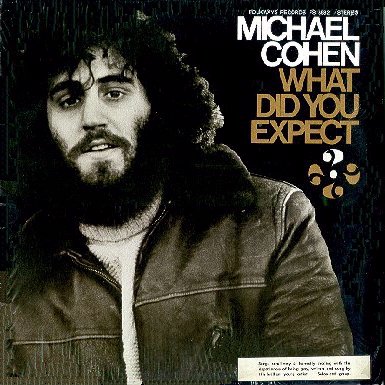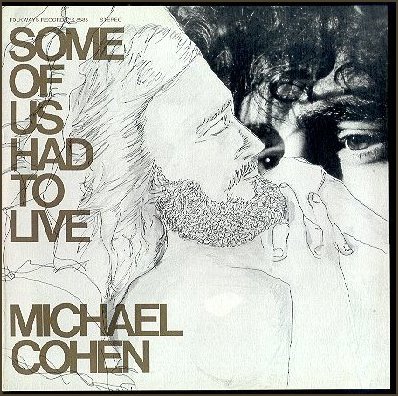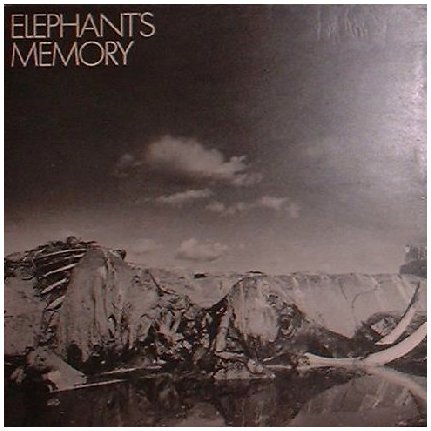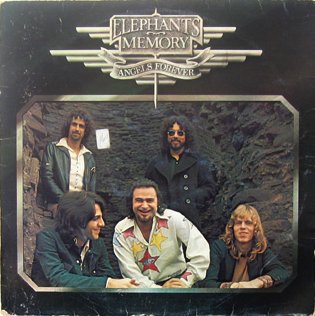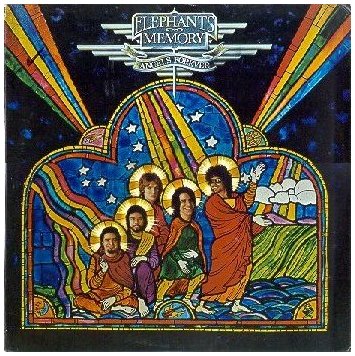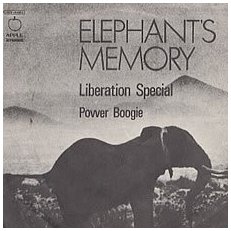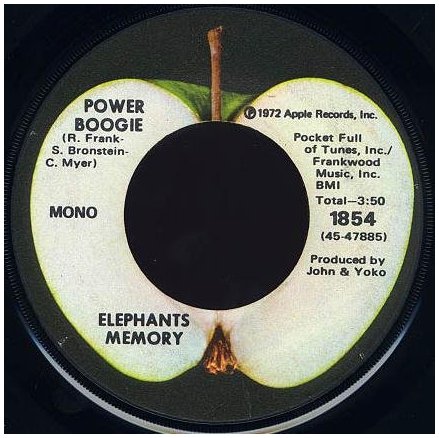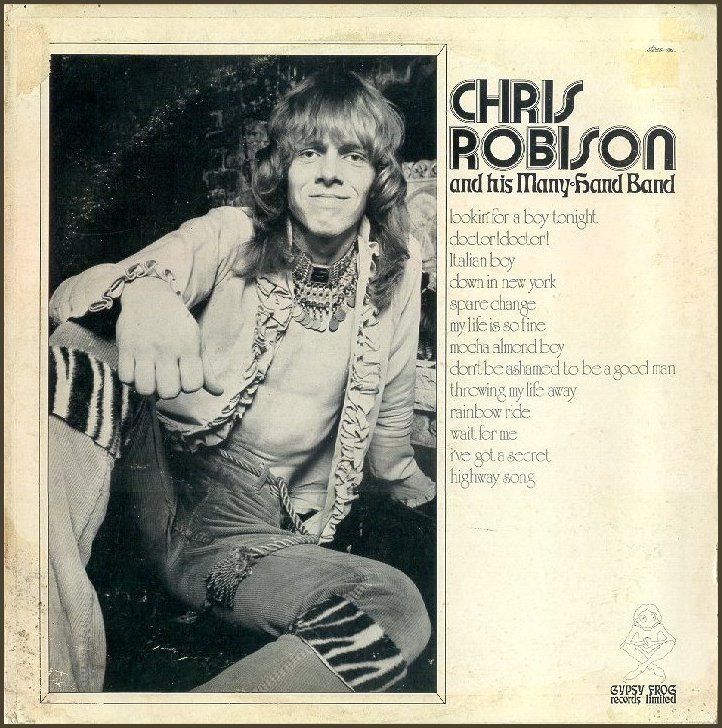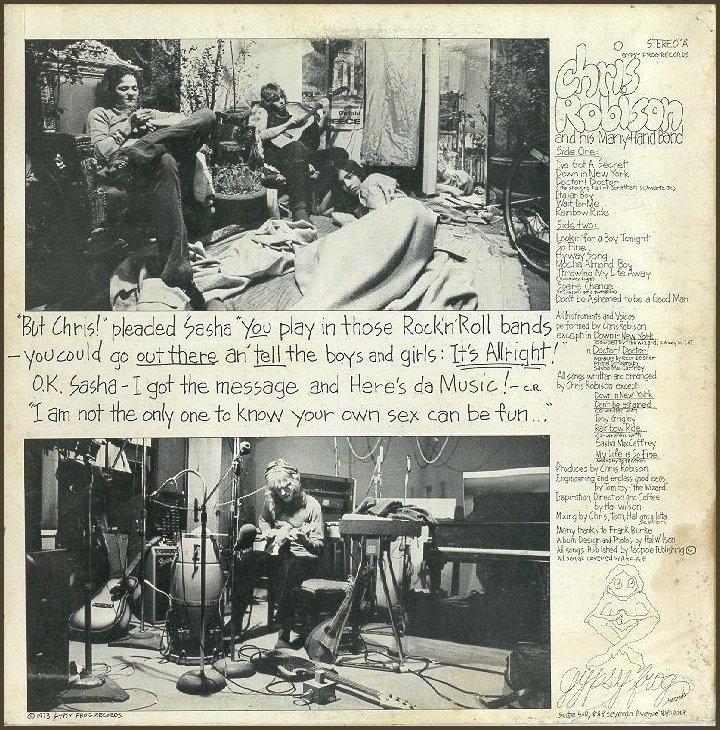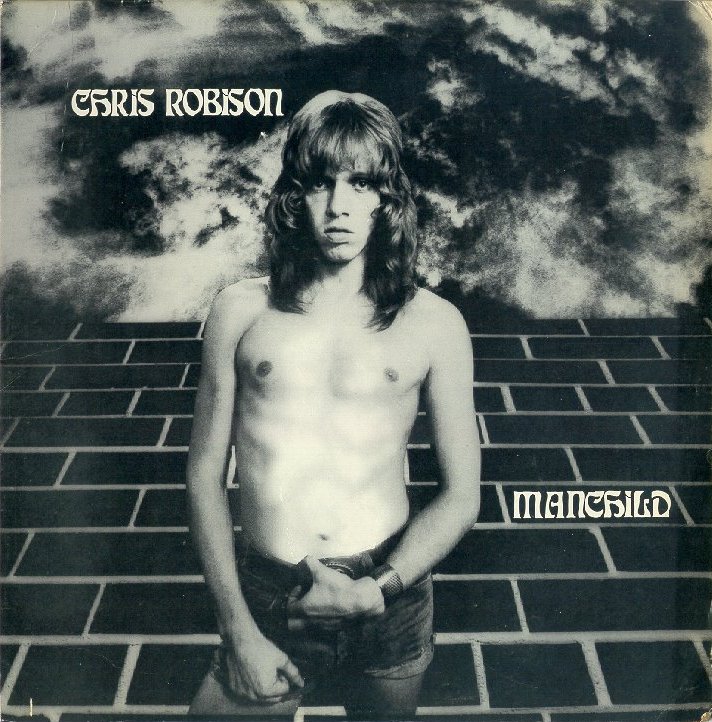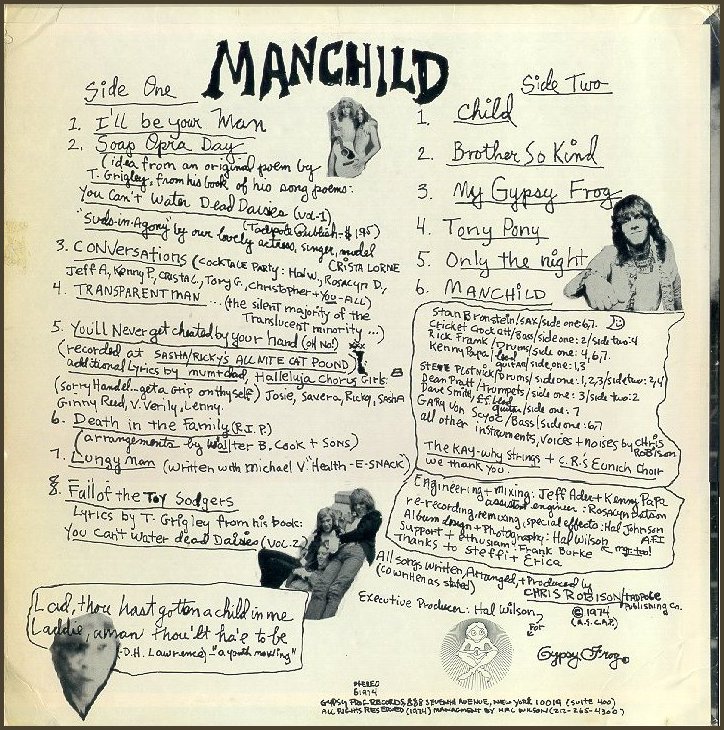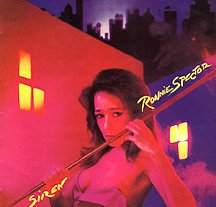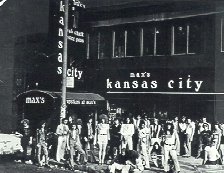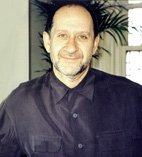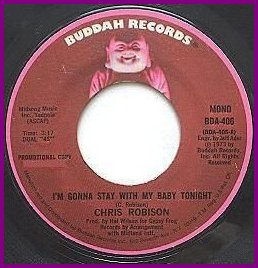|
QMH, June 2005, Script Everyone Involved - A Gay Song (1972)
That very anthem-sounding song is also very obscure. It's from 1972 by an English group called Everyone Involved, and the album was called "Either/Or." They only pressed 1000 copies of it and gave most of them away. The song was appropriately called "A Gay Song" and it's one of the earliest openly gay songs to be released. You're listening to Queer Voices on KPFT and this segment is called Queer Music Heritage. I'm JD Doyle and the rest of tonight's show will explore the music of two other artists who had openly gay recordings in the early 70s. The second artist we'll hear about is Chris Robison, and I've got a special interview with him. Besides releasing his own very gay albums, his career was wide reaching, and for example, involved working with Keith Richards, John Phillips, the New York Dolls and John Lennon. We'll hear from him a little later. But first up is Michael Cohen, a New York City singer/songwriter who self-released his own album in 1973 and then the same year released another album, this time carried by the very reputable Folkways label. His albums were among the first with openly gay lyrics. Frankly, I wish I knew more about him, and my internet searches have come up dry, so all I have to go by are the liner notes from his three albums.
My first exposure to him was his Folkways album, called "What Did You Expect." It's a good-looking album, with a large photo of Cohen on the front…he's got bushy hair and a beard…and inside is a nice six-page booklet of the lyrics, and there's a sticker on the cover, obviously placed after printing, that says "Songs sensitively & honestly dealing with the experiences of being gay, written and sung by this brilliant young artist." I'm going to start off with the gayest song on the album, "The Last Angry Young Man." Michael Cohen - The Last Angry Young Man (1973) The lyrics of many of the other songs on the album are very poetic, full of imagery, and often you wonder what on earth he means by his words, like on this one, called "Bitterfeast" Michael Cohen - Bitterfeast (1973) I mentioned that Michael Cohen had two albums in 1973, and I'm guessing the other one was actually released first, as it was self-produced and obviously self-released as the notes on the back are hand-written. It's also self-titled and it's interesting that it's just called "Mike Cohen," instead of Michael Cohen. I'm betting that when he landed the Folkways deal he decided to be a little more formal. Also, five of the songs on the first album also ended up on the Folkways album, but with new, more professional recordings. Here's a track from the first album that wasn't repeated. It's called "Danny and the Central Park Snow," and is the only song by him with a country feel to it. Mike Cohen - Danny and the Central Park Snow (1973) That was called "Danny and the Central Park Snow," from the album just called "Mike Cohen." Another interesting song from both the 1973 albums is one called "Orion" Mike Cohen - Orion (1973) Michael Cohen had one other album, to my knowledge, and it was also on the Folkways label. It came out in 1976 and was called "Some of Us Had To Live." It is also full of lots of poetry and imagery and, to my reading, no openly gay lyrics, but I kind of like it's closing track, called "In a Dream, Again" Michael Cohen - In A Dream, Again (1976) All three albums by Michael Cohen are very rare, especially the self-released one, but fortunately for collectors the Folkways albums are now available on CD. In an amazing project of the Smithsonian Instutute, they acquired the complete recordings of Folkways and any of their 2,168 albums can be ordered on CD on-line, and that includes several other gay titles, like the historic "Walls To Roses" album, and another called "Gay and Straight Together." This is a good time to invite you to check out my site, at www.queermusicheritage.com. If you visit it while you're listening you can see the playlist and follow along, while looking at photos of the artists and recordings. I've always considered our music history as a visual as well as an audio experience. Also, for more very queer programming, please listen to After Hours with Jimmy Carper, now in its new time every Friday night/Saturday morning from 1 to 4 am, on KPFT, it's Queer Radio, with attitude. Steam - Na Na Hey Hey Kiss Him Goodbye (1969)
I'm sure you instantly recognized that song, as it was a huge smash hit in 1969 for a group called Steam. That's where I'm starting my interview with Chris Robison. What was the first rock act you were involved with that had some success? It depends on what you mean by success, but I think that Steam was a pretty successful group. They had a big hit song called "Na Na Hey Hey Kiss Him Goodbye" that sold about 4 ½ million records around the world. That was written by a guy named Paul Leka, L-E-K-A, and this guy, Paul Leka, would just record songs and put them out there with different names, and if it hit and took off then he would go out and get a bunch of people who were already in a band, and say "okay, you guys are going to be…the Lemon Pipers." The Lemon Pipers was his name for a song called "Green Tambourine," which was a big hit. So although there never was really a band originally Steam, we were Steam in as much as we went out on the road and played, you know, three weeks at a time, one-night-stands That must have been a great experience. Well, it was very interesting. We would go out and we would play places like Enterprise, Alabama, and Washington, North Carolina, all through the South, the Midwest, and he had us do different shows on TV, things like that, you know, it was a very big song, and it was really good training, I guess. This would have been around 1969, how old were you? Right, '69, I would be 21 After Steam, what came next? After Steam I joined a group by the name of Elephant's Memory, and Elephant's Memory is a band out of New York who is…the joke is, half the musicians in New York City played in that band at one point. I joined that band in 1970 and I was with them two different stints, each one was about a year. Your specialty was keyboards? At this point it was keyboards but I also played guitar In that band. Your first stint in Elephant's Memory, did you record with them? No, at that point I didn't record with them but we toured again all over the place. At that point they were very politically motivated because they had had a house in Spring Valley, NY, which is just upstate a bit. It was burned down just for the sole reason that they were long-haired sort of hippie type musicians and that sort of radicalized their way of looking at things, and when John Lennon came over….the reason why I was telling you about the activist period that they had…and when I was with the band the first time we played for Puerto Rican Liberation Front and all these sort of things like that. So when John came over to America to live he was met at the airport by Abbey Hoffman and Jerry Rubin, who were early sort of radicals during the Viet Nam War. They were politically active people and they brought John down to meet the Elephant's Memory in New York and John took out his guitar and started playing "Blue Suede Shoes" and the rest of the band just joined in and that was it, they were the backup band. So as a backup band they did a lot of stage work with John and then they recorded John's album "Sometime in New York," which is the only Beatle album which did not sell enormous amounts of copies. In exchange for recording with John on John's album, John and Yoko recorded the Elephant's album with them, which would be their third album And so you were obliquely involved with that album, right?
Yes, I was, what happened was I sort of tend to stay with a band for nine or ten months and then go off, and I was with Elephant's Memory the first time, and I was approached by a man named Velvert Turner, who was Jimi Hendrix' little brother and sidekick and protégée . And he whisked me off to Los Angeles where I did an album with them and did about a year's gig with them. And when I came back to New York I immediately got back together with my friends at Elephant's Memory. The drummer, Rick Frank, was my best friend and they had asked me point blank, "come on back into the band." And I said, "Well, I need a little bit of a rest, you know, before I get into a band again." And I swear if it wasn't the very next day it was a day soon thereafter that when I went over to Rick's house he pulled me into his door, and he said, "Listen, Chris, we just met with John Lennon, and we're his backup band now." So actually I went into a state of shock there for a moment and I said, "Well, you know, um," I said real sheepishly, "Well, I'll come back in your band now." And he said, "Oh, no, no, no, no, Chris, I can't do that now, we're John's backup band, but we'll work…we'll be doing some songs that we had written together." So, and I did get to work with John in the studio so obliquely as much as I worked and sang backup with John on some of the Elephant's songs, and also, a couple of those tunes on the Elephant's album, which was produced by John & Yoko, a couple of those tunes were co-written by me, as I said, and if you look at the credits on that you'd see on "Power Boogie," for example, John plays guitar on my song and sings, and so does Yoko, Yoko also sings on by song, which is kind of neat. Yeah, to have John Lennon sing on and produce one of your songs… So, when I say I worked with John Lennon, absolutely I did, but sometimes I get sort of backlash, saying, oh, I don't see you on the cover and you weren't on the TV shows, and that's true, but I played in and out of many different bands and it was my greatest thrill to be able to work with John and Yoko, very nice people… Elephant's Memory - Power Boogie (1972)
From 1972 on the Beatles' Apple label, that was a little of the song "Power Boogie," as sung by the group Chris Robison worked with, Elephant's Memory. Chris doesn't appear on that track but he co-wrote it and John & Yoko produced it and sing backups, which is not too shabby. In 1973 Chris released his first solo album, called Chris Robison and His Many-Hand Band. This is the album I first heard about as a collector of openly gay recordings as it contains the very gay song, "Looking For A Boy Tonight." Remember, this was 1973, very early for material of this nature.
Tell me about the making of your first solo album I had all the way along been kind of wild and crazy and had never hidden my sexuality to any of the bands that I was in, and I just got to the point where I thought, well, I had written all of these songs on gay subjects and gay themes and of course that was a major part of my life, and I had a manager called Hal Wilson, and this was just the time when was fashionable, fashionable to be bisexual, and fashionable to be into glitter rock and fashionable to tease one's public about your sexuality… What year was this? This would be 1972, and in 1972 Hall Wilson, my manager, said, "why don't you do a few songs on a gay album? You can do it as well as anyone, and you're actually not a poser, as it were." So we went and recorded a couple of songs and brought them around to different places to see if we could get some backing on them. Of course people were just freaked out. Executives at companies were just not ready for that sort of thing They just wouldn't listen to it, wouldn't hear about it, what? Well, they wouldn't, they weren't ready for a gay album by an artist who is really a musician first and not some kind of flamboyant sort of performer So they weren't ready for an artist, as opposed to an act? That's right. Someone who sort of titillates, you know, the bearded lady, the whatever, and they weren't ready for just plain music Did you view it as a political act? Well, no, I really didn't. I didn't think of it as a political act, and for me I just wanted to write songs that were me. No, I didn't think it was political. For me it was just…freedom. It represented freedom for me. So you had resistance from record labels. How did you finally get the album recorded? Well, I took out a loan. I rented a studio that had very good rates, and, as I played all of those instruments anyway I went around and recorded the whole album within 20 hours. And I would go and play the piano on each song, and then I'd go and put the bass on each song, and then put all the drums on each song. In other words, just put it together the best I could So you called it Chris Robison and His Many Hand Band, but it was all you Right, I did all the parts [Chris Robison - Don't Be Ashamed (1974) in background] How many copies were pressed? Let's see…the first pressing was maybe four thousand copies. I can't remember exactly the second pressing…I think it went into a third pressing. And we took out a small ad in a theatre magazine in New York called "After Dark,"
and in the add we made sure it was very out front in the ad, having a list of the songs, and "I'm not the only one to know that his own sex can be fun" and just sold it. We had a suite up on Second Avenue. We just sold those things, all around the world. You know, it got me into a lot of trouble. On the one hand I got to say what I wanted to say, but at that time in history or the grand scheme of things people just weren't that out, and Stonewall had just happened a few years before and it was very strident and loud and angry sort of liberation But your album, the tone of it is so friendly Yeah, that's true, that's true It's so good-natured That's right, it was good-natured and friendly because I just didn't feel like going out there and saying gay is good, gay is good, gay is good, gay is good, gay is good. That wasn't the point. The point was I am who I am, so when I came along and just innocently put out this album, sort of it was like a bombshell, and I got backlash actually from it from the gay groups because it wasn't radical enough, or it wasn't butch enough or it wasn't…you know, it wasn't whatever group was talking at the time, it wasn't…the trouble I got into was, I became a lightning rod for everyone who wanted to be out, who wasn't, but who wanted to meet a gay person who didn't know anyone because no one was saying who they were Were you able to get gigs to promote this album? Yes, in fact…the first gig…I did some club gigs and then I actually played in the summer of 1973 at one of the first gay rallies on Gay Pride Day, and they set up a stage right on Washington Square Park, under the arch, and we played to just a packed, a packed Washington Square, and it went down beyond Washington Square to the side streets. And I played that, and Bette Midler played directly after me This was what, '73? '73, Yup, June of '73. Tell me about "Doctor Doctor" "Doctor, Doctor." I thought it'd be fun to do a song where the lyrics were "Doctor, Doctor" Well, that's perhaps the most political, or angry song on the album. Yeah, it is pretty political, and it's the story of a man who every time he sees a young man that he's attracted to, it just sort of really rattles him. He has to talk it over with his doctor, and his doctor just says, "well, you know" and he's had electric shock therapy and…I had actually met a person on the street who had said that he had electric shock therapy to deal with his feelings and discomfort with his sexuality. I thought it'd be fun to make fun of that. So in the course of the song the man actually does face up to his sexuality and desire and instead of spending money on the doctor, the shrink, he spends money on a nice young man who was leaning against the fence and took him to dinner, had a good time, and by the end of the song he's cured, and he's cured from going to the shrink. He's cured because he's happily gay and comfortable with his sexuality Chris Robison - Doctor Doctor (1973) This next song we'll hear about is the one I told you about earlier. It's the very blatant, very good natured and very fun song "Looking For a Boy Tonight." That's probably my least subtle song ever, and I was uptown and decided to take a bus instead of a subway and I was sitting in the back of the bus, going down Broadway, and the song just came to me. I was looking out the window and sort of cruising the street, and I just wrote it, "Looking For A Boy Tonight." By the time I got off the bus in Greenwich Village it was finished Did that song get the most attention on the album? Yeah, that one was the one. And that one was played at all the different clubs in New York. It was straight out front, straight out front, that was the one that was easiest for them to latch on to sing along to. I used to play that different clubs and have people singing along Chris Robison - Lookin' For a Boy Tonight (1973) Yes, I am not the only one to know his own sex can be fun, I'm looking for a boy tonight. And did you notice in the beginning where he said "ladies and gentlemen, the other boys in the band asked me to take full responsibility for this song and its lyrical content"? That was a very inside joke, as you heard Chris say earlier in the interview that it was all him on the album, all the voices all the instruments. He sure did a good job making it sound like a live performance. Tell me about "Mocha Almond Boy" Well, Mocha Almond Boy was an Italian, African-American boy in the neighborhood who I was infatuated with. He had beautiful mocha almond skin and beautiful curly hair. I wrote that about him, again, a song that just came to me very, very fast Chris Robison - Mocha Almond Boy (1973) Your second album, "Manchild" came out pretty quickly after the first, how would you compare the two?
Well, on the "Manchild" one I used many more musicians, and it was put together over a matter of months, and I thought it would be fun to use the concept of manchild. I thought it would be fun to have on one side, the man side, and then the second side sort of a more childlike side From the "man" side of that album, tell me about the song "I'll Be Your Man." Oh, that's pretty angry, that's an angry song. When I was in the city and would be out with my boyfriend I would just feel no compunction at all, you know, no problem at all just walking down the street, you know, arm around him and kiss him broad daylight in straight neighborhoods, that sort of thing. That's what that is talking about, the stand why don't you just let me do what I want to do and why does that bother you? Chris Robison - I'll Be Your Man (1974) And on the other side, the child side, was the song "Tony Pony" Well, if it wasn't for Tony Pony…he was, he was really my warrior. Well, Tony Pony was a kid that I met on the street. He was basically a throwaway kid by the age of 14, from New Jersey, and I took him in and he lived with me for many years and I taught him how to play music and he taught me how to just go for it and not be afraid Chris Robison - Tony Pony (1974) On the back of that album is a small picture of two guys nude with a guitar in front of them
Yeah, yeah, that's me and Tony. I remember Tony cursing me out for that. I mean, we went to a session and Hal Wilson, my manager and partner in this endeavor, did a lot of album covers, he was an artist and he had a session with us and it got a little bit wild and he said okay…it was sort of like when you see on TV when the guys says, he's snapping all the pictures of the model, you know, "good, baby, good, baby, again, take that off, take this off"…so, pretty soon we were nude and he kept snapping. But Tony said, damn that picture, you never told me you were going to put that picture on the album. I had to scratch it off before I showed that album picture to my mother You sent me several demo songs, and I don't know the time period they're from, for example "Southern Philly Boy" Let's see, I wrote that probably around 1975… So, shortly after "Manchild" then? Right, that was supposed to be on the third album, which I now am going to finish up and put together and the third album was just going to be just sort of more folk and more pretty, just more relaxed. And that song was about Tony as well Tell me a little more about that song. It's just a celebration about a feeling that you have for someone. I had just met Tony and it talks to some of the things that Tony had to go through, and kids have to go through in order to survive. Even today I guess people who come out to their parents or their family are just disowned. Tony was a throwaway kid and the idea that a kid has to come to New York. A kid who's a runaway, coming to New York and trying to survive. Well, how's he survive? Well, he might be on the street, he might meet up with someone who might get him into hustling or prostitution, but if he's lucky he's going to meet up with someone who really takes an interest in him as a person, not just sexually, but takes…how can I say it? [to be a mentor] Yeah, a mentor. It goes back to the old ancient Greek time, when the old Sparta was completely an institution. A guy could be a 26-year old guy who would take a younger lover, and be his teacher and mentor, all that, all in one thing together, so that was a bit of a dangerous song Chris Robison - Southern Philly Boy (1975) Did you have many people misunderstand your lyrics and took it to be more of a man-boy love? [Chris Robison - Rainbow Ride (1974) in background] Ah, yeah, but that's probably my own fault. It's just, I guess….now where does this radio show go? All over the world? Yeah, it's net-cast. Lovely, lovely, lovely. Well, I think that the whole man-boy thing. I mean, I'm not going to talk about that whole thing, but with me it was not really a sexual thing. Tony and I in those days were not lovers. We were just very close. But it's more of a…in my head, sort of like, to protect, to relate. Yeah, I probably got into a little trouble with that, but you know, it wasn't so…it wasn't so politicized then, so demonized, so…you know, that's the sort of thing people like Anita Bryant sort of used this idea of homosexual being a child molester. They used that to galvanize the troops, as it were, and to build what is now the Christian Right, that kind of runs this whole country In 1974, there was also a 45 on the Buddah label, called "I'm Gonna Stay With My Baby Tonight," which I consider one of your finest works. Tell me about it. Ah, that took about seven minutes to write. I sort of wrote it and then I hummed it over the phone to Hal Wilson, and he said, "Chris, we have to record that right away." And we did. I recorded it with Elephant's Memory as a backup, and immediately got it on Buddah Records. The only problem was the Buddah Records was on shaky financial grounds at that time, and kind of folded soon thereafter. There have been recorded about 13 different versions now around the world. There's one by George McCrae as a disco version, and Ronnie Spector did a version of it. She was from the Ronettes. She did a really kick-ass version of it. [yeah, I like her version] Yeah, I kind of like that, too. And it was done by a man called Sticky Patch, out of South Africa. There are endless versions of it. It has not been a hit in the United States, but I still get royalties from around the world from it. Ronnie Spector - I'm Gonna Stay With My Baby Tonight (1974)
No, of course that wasn't Chris singing that one. That was Ronnie Spector of the Ronettes, from her "Siren" album, from 1980. I also love Chris' version and I'm saving that for later in the show. [Stumblebunny - Don't Wanna Lose (1979) in background] Okay, moving to 1975, you toured with the New York Dolls in Japan. Yup, sure did, that was fun. It was kind of odd because they, they're more popular than I knew. I mean, people today if I tell them that I played with John Lennon, recorded with Keith Richards, they say, uh huh, and then I tell them I worked with the New York Dolls it's "You worked with the New York Dolls!" They were kind of breaking up at that time? Yeah, well, they had been breaking up right along. Constantly breaking up. They'd lose a member to heroin or lose another member to something else but it was a fabulous gig. We went over there and played on tour with Jeff Beck, who used to be in the Yardbirds I think the Toyko Dolls Live is an album. Yeah, it was an album that was put out by a fan club Tell me about Stumblebunny
Stumblebunny. Don't you think that's a terrible name for a band? Where'd you get that name? I don't know, just pulled it out of a hat. I was just out of the New York Dolls at that time and it's kind of not fun being without a band if you're used to being in a band. So I marched myself down to Max's Kansas City,
which was the local place where everyone played, and, because I knew the booking agent and had just been in The Dolls, I told a fib. I said, I got this brand new band and it's name is, um, Stumblebunny, yeah, Stumblebunny, that's the name, and we need a booking, so book us as soon as you can. So the first available booking was a few months from then and they booked the band, and I put the band together afterwards And you released an EP? Yeah, what happened was after I finished recording with John Phillips and Keith Richards, I got a big chunk of money for recording with them, so we did an EP with four sides to it. And then I got a whole bunch printed up and the bass player and I just went up and down Tin Pan Alley, all up and down 6th Avenue, to every single office in the music business, and just handed them out to every record company like they were Frisbees. And then we got a call from one guy, named Richard Gottehrer, who was associated at that time with Sire Records. Sire Records had people like The Bangles and Robert Gordon, and he just said "Hey if you can do this song, put out that record, I want to sign you Well, he's got a long history of production success, with the Strangeloves and the Angels, the Girl Groups… ***
During his extensive career in the music industry, Richard has been a successful songwriter ("My Boyfriend's Back," "I Want Candy," "Sorrow"), producer (Blondie, Go Go's, Joan Armatrading, "Hang On Sloopy"), and business executive (Co founder of Sire Records with Seymour Stein). Currently, Richard is CEO of The Orchard, the largest supplier of independent music to the Internet stores. *** Right, he put all those together. He's a guy from the Bronx and {sings} "I Love Candy, bump, bump, bump, bump, bump." That was a hit. He produced us and through him I got to play on different albums of people he was working with at the time, like Robert Gordon, who was a rockabilly fellow, and Link Wray. Richard Gottehrer was producing those people at that time. It came out in Germany; it was pressed in Germany, Holland. I liked that album. And we went and supported it on tour in Germany and England, second billing to the Hollies From that album tell me about "Young Stuff" Yeah, I was on Grove Street and all the sort of kids in the neighborhood, the teenagers, would come over and hang out at my place. Markie, he's still around in the neighborhood. Markie said "See ya, Chris, I'm going to go out. I'm going to go down to the yard," which was PS 41, public school on 11th and 6th Avenue, "I'm going to go around and check out the young stuff." I said, "Oh, what a good expression, young stuff." I went over to Rick Frank, the drummer of Elephant's Memory and we decided that was really a good concept for a song, and we wrote the song based on him saying "young stuff." I even gave him credit for coming up with the idea. Stumblebunny - Young Stuff (1979) That was "Young Stuff" from the album by Chris' group Stumblebunny, from 1979. The album was called "While You Were Out." I think it's an excellent album and it's unfortunate it was only released in Germany. What did you do musically during the 80's? During the 80's. Well, unfortunately when my alcoholism and substance abuse caught up with me, about '81 or so, '82, then I worked very hard to rehabilitate myself. I even went to a rehab out in Minneapolis, but unfortunately I did make sort of the cut off between that and music. In other words it was so wrapped up with the scene and sort of what goes on, it's hard to be in the music business, at least in those days, and not be confronted at every turn with alcohol and all that, so I sort of threw away the baby with the bathwater as far as that goes with performing. [Stumblebunny - Jimmy Rowe (1979) in background] And then I always wanted to be a father and I thought that now that I'm sober and straight with the program, this was the time to do it. And I had a girl, friend, who…a strange and enchanted girl. She was friends with Peter Allen, the performer, and made clothes for Peter Allen, and she just accepted me for who I am, who I was. We proceeded to have a couple kids, two boys, so during those years, to answer your question, I sort of focused more on children's songs because, hey, I was at home taking care of the kids. I took my cue from John who stayed home with the kids while Yoko worked. And my wife had a clothing store which I backed. She would work that while I stayed home with the kids and came up with children's songs. That led to a children's album later on That album was 1994, under the name Papa Chris Major, your family name Papa Chris Major, yes, my family name. But Hal Wilson had said to me, and it might have been true at that time, but he said "Chris, the gay market and the children's market don't mix." Are those your kids on the cover of the CD? Yeah, those are my two children, and they sing on it, too Your partner on the album, Steve Farrell, is he gay? Yes So it was sort of a gay children's album Yeah, I guess it was, it was.. But not marketed that way. I know gay artists now who have children's albums Yeah, why not? Absolutely. And that's the way it should be. You know, in the old days it just was a struggle to so announce one's gayness, and that was all so very exotic, but as life goes on we're just part of the fabric of society Papa Chris & Steve - See Me See You (1994)
And that track was called "See Me See You" and is from Chris' critically acclaimed children's album from 1994. He and his music partner Steve Farrell released that under the name of Papa Chris & Steve Of which of your recordings in your career are you the most proud Ah, "Many-Hand Band" and "Manchild." Those are the ones that really let me be myself. Are there any questions I should have asked you? Well, you know what? I did think that it's ah sort of like "The Tale of Two Cities." You know how it starts out, "It was the best of times, it was the worst of times." And I think about that in context to gay life, and although you can say, well yes, gay is on TV and gay is accepted, and gay has made great strides in the past 20 or 30 years, it really is also a very horrendous time for gay people because of the political climate and homophobia. And I think the fact that gayness is out there and recognized…especially now in high school and college it can actually put more of a danger to some people because straight people are more threatened, and straight people are more inclined to dehumanize people, because gay is an entity, gay is something that is recognizable, gay is easy to say, "okay, let's beat up, let's hang someone on a fence because they're gay. [Papa Chris & Steve - Time To Say Goodbye (1994) in background] So in other words, when it was less out front it might have been safer in some ways. And that troubles me, so I'm very proud and ready to go back out there and do these albums again and play, and promote, and say "screw you," anyone who doesn't like it, "I'm gay and I say I'm gay," and even to speak to what we've touched on before about love between people of different ages. I don't really care. I just think, I think people need support, and I definitely need to support myself, and say what I want to say out there. Yeah, the best of times, the worst of times, and people are running for the hills, they're running for shelter, except for some very brave people in the political spectrum, people like yourself who have a show that's really out there, and doing a service to the community, so I think I'm doing the right thing. I feel proud doing it. Now that his kids are grown, Chris is ready to devote more time to his music, and plans on releasing his third solo album this year. You can learn more about that and his career at www.chrisrobison.net. Now, I've got one more song to share with you, but before I get to it I want to thank you all for listening, and to thank Chris Robison for the interview. And, as always if you have questions or comments about any of the music I've featured, please write me. And I wish you would. My website, of course is at www.queermusicheritage.com. This is JD Doyle for Queer Voices on KPFT in Houston. I'm closing the show with one of my favorites of Chris' songs, and it's been covered by a number of artists. You heard a bit of Ronnie Spector's version earlier, but now you'll hear it by Chris Robison. From 1974 here's "I'm Gonna Stay With My Baby Tonight" Chris Robison - I'm Gonna Stay With My Baby Tonight (1974)
|

